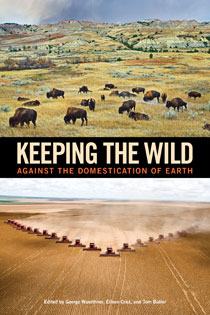"As an account of underlying concepts, the history of ideas, and neo-green philosophy...this book is outstanding."
Biological Conservation
"...an invaluable read for those who love wild places."
Earth Island Journal
"...[T]he book contains thought-provoking and damning examples of how the 'Neo-greens' have abandoned the preservation of Nature in favor of human re-engineering of the earth's natural ecosystems and dwindling wilderness."
Helena Vigilante
"We all need to read [Keeping the Wild] and become fully aware of the dangers it describes. We need to familiarise ourselves with all the arguments these writers have so clearly and thoroughly articulated if we are to have any hope of countering the insidious Anthropocene trend before it gets any further entrenched."
GreenSpirit Magazine
"In a collection of thoughts from prominent conservationists, editors Wuerthner, Crist and Butler build their case against our move toward the anthropocene, where there is a focus upon human dominance over the environment."
Steamboat Magazine
"...immensely stimulating"
Northern Woodlands
"...a high quality collection of essays"
Environmental Values
"I found all the essays well written ... thought provoking. ... I recommend the book to any resource manager who must consider the diverse and often conflicting views of various entities when resolving natural resource issues."
Rangelands
"Keeping the Wild isn't a potboiler; it is a pot-stirrer. If the book doesn't succeed in igniting real debate about the direction of the conservation movement, then perhaps it will at least jolt the green establishment out of its uninspiring narcolepsy."
Jackson Hole News & Guide
"a seminal body of impressive scholarship throughout and very highly recommended"
Midwest Book Review
"...contribute[s] to an important and unfolding dialog..."
Restoration Ecology
"Keeping the Wild: Against the Domestication of Earth is an extraordinarily important book. It identifies the great and irreversible damage to Earth's biodiversity that will follow if the 'Anthropocene' ideology is allowed to stall the global conservation effort."
Edward O. Wilson, University Research Professor Emeritus, Harvard University

